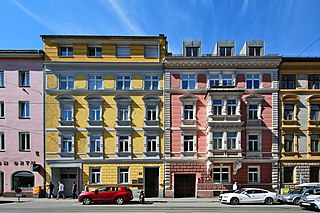
Innsbruck is the capital of Tyrol and the fifth-largest city in Austria. On the River Inn, at its junction with the Wipp Valley, which provides access to the Brenner Pass 30 km (18.6 mi) to the south, it had a population of 132,493 in 2018.

Leontopodium nivale, commonly called edelweiss, is a mountain flower belonging to the daisy or sunflower family Asteraceae. The plant prefers rocky limestone places at about 1,800–3,000 metres (5,900–9,800 ft) altitude. It is non-toxic and has been used in traditional medicine as a remedy against abdominal and respiratory diseases. Its leaves and flowers are covered with dense hairs, which appear to protect the plant from cold, aridity, and ultraviolet radiation. It is a scarce, short-lived flower found in remote mountain areas and has been used as a symbol for alpinism, for rugged beauty and purity associated with the Alps and Carpathians. It is a national symbol, especially of Romania, Austria, Slovenia, Switzerland, and Italy. According to folk tradition, giving this flower to a loved one is a promise of dedication.
Inspector, also police inspector or inspector of police, is a police rank. The rank or position varies in seniority depending on the organization that uses it.

Law enforcement in Austria is the responsibility of the Directorate General for Public Security, a subdivision of the Federal Ministry of the Interior located at Herrengasse 7 in Vienna. Over 20,000 police officers are on duty in the Federal Police at more than 1,000 police stations. On lakes and rivers the federal police has over 70 boats and other craft to act as the water police.
The Kaiserjäger, were formed in 1895 as four normal infantry regiments within the Common Army of Austria-Hungary. Despite the name "Tirol" in its title its members were not just recruited from the crown land of Tyrol but also from other parts of the monarchy. The regiments were disbanded in 1918 with the end of the k.u.k. monarchy. The word Jäger is a characteristic term used for light infantry or light infantrymen in a German-speaking context.
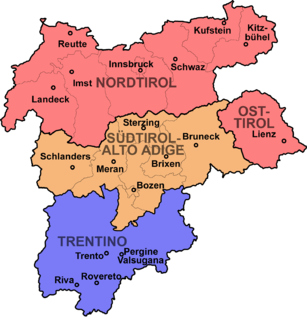
In 1919, at the time of its annexation, the middle part of the County of Tyrol which is today called South Tyrol was inhabited by almost 90% German speakers. Under the 1939 South Tyrol Option Agreement, Adolf Hitler and Benito Mussolini determined the status of the German and Ladin (Rhaeto-Romanic) ethnic groups living in the region. They could emigrate to Germany, or stay in Italy and accept their complete Italianization. As a consequence of this, the society of South Tyrol was deeply riven. Those who wanted to stay, the so-called Dableiber, were condemned as traitors while those who left (Optanten) were defamed as Nazis. Because of the outbreak of World War II, this agreement was never fully implemented. Illegal Katakombenschulen were set up to teach children the German language.

The South Tyrol Alpine Club, abbreviated AVS, is an association of German and Ladin-speaking mountain climbers in South Tyrol, northern Italy. Founded in 1946, it is sub-divided into 32 sections and 58 local divisions. The AVS is based in Bolzano and has more than 60,000 members.

The Großache is a river, 79 kilometres (49 mi) long, in the east of the Austrian state of Tyrol and the Bavarian region of Chiemgau.

The Tyrolean Rebellion of 1809 was a rebellion of peasants in the County of Tyrol led by Andreas Hofer against the occupation of their homeland by the French and Bavarian troops within the context of the War of the Fifth Coalition against Napoleon I.

The Arnspitze Group is a free-standing mountain chain in Austrian and Germany, in the states of Tyrol and Bavaria, between Seefeld in Tirol and Mittenwald, and between the Leutasch valley in the west and the Isar valley near Scharnitz in the east. In the literature, the Arnspitze Group is classed as part of the Wettersteingebirge. The majority of the group belongs to Tyrol, a northeastern part of the chain lies in Bavaria. The border between Bavaria and Tyrol runs over the summit of the Große Arnspitze.
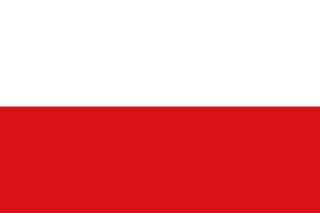
Tyrol is a historical region in the Alps - in Northern Italy and western Austria. The area was historically the core of the County of Tyrol, part of the Holy Roman Empire, Austrian Empire and Austria-Hungary, from its formation in the 12th century until 1919. In 1919, following World War I and the dissolution of Austria-Hungary, it was divided into two modern administrative parts through the Treaty of Saint-Germain-en-Laye:
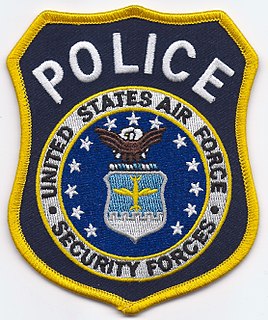
The United States Department of the Air Force Police are the civilian uniformed police service of the United States Department of the Air Force, responsible for the force protection of assets and all aspects of law enforcement on U.S. Air Force and U.S. Space Force installations, and other facilities operated by Air Force and Space Force.
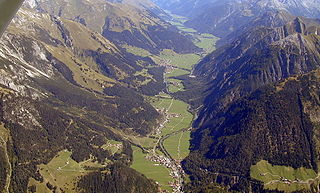
The Lechtal is an alpine valley in Austria, the greater part of which belongs to the state of Tyrol and the smaller part to Vorarlberg. The Lech river flows through the valley.

The Standschützen were originally rifle guilds and rifle companies that had been formed in the 15th and 16th centuries, and were involved time and again in military operations within the borders of the Austrian County of Tyrol. A Standschütze was a member of a Schützenstand, into which he was enrolled, which automatically committed him to the voluntary, military protection of the state of Tyrol. In effect they were a type of Tyrolean local militia or home guard.
This article deals with the rank insignia of the Austro-Hungarian Army, as worn by the Austro-Hungarian Army after the reorganisation in 1867 until 1918.

Ingrid Felipe is an Austrian politician from the Green Party. She has been second deputy Governor of Tyrol since May 2013 and from June to October 2017, she served as federal spokeswoman of her party.

The Bergwacht is an organisation that is part of the German Red Cross (DRK-Bergwacht), whose primary functions are mountain rescue and nature conservation. The voluntary organisation provides over 90% of the emergency services in the impassable terrain of the German Central Upland and Alpine regions. By contrast the Austrian Berg- und Naturwachten Österreichs purely looks after nature conservation and the environment, leaving Alpine rescue in the hands of the Austrian Mountain Rescue Service.

The regional cuisine of different regions of the Alps is called Alpine cuisine. Despite clear regional differences, this cuisine has been characterised throughout the entire Alpine region for centuries by the isolated rural life on the alpine huts and in the mountain villages. The staple foods that are still available today include milk and dairy products, cereals and desserts, as well as meat preserved by drying and smoking.
The police in Canada's ranks differ according to the different police forces and depend on different laws at the federal, provincial, and municipal levels.

Georg Bilgeri was an officer in the Austro–Hungarian Army, mountaineer, and Austrian pioneer of skiing. Bilgeri learned to ski in Gargellen about 1893.


























